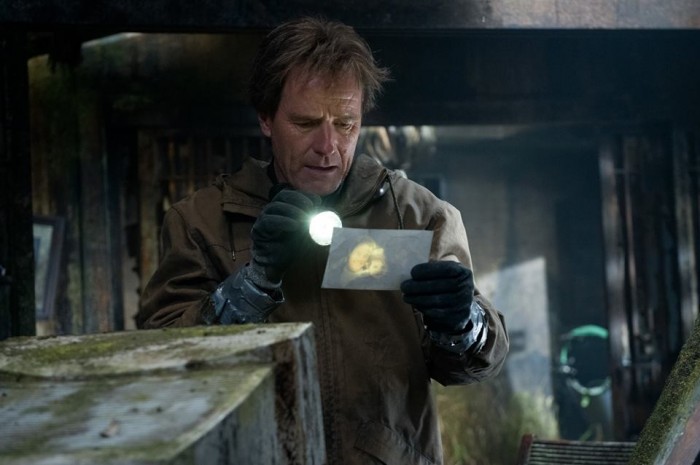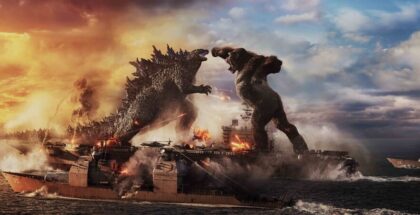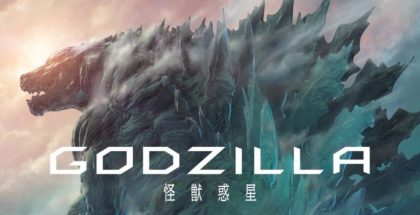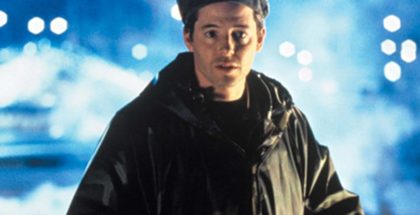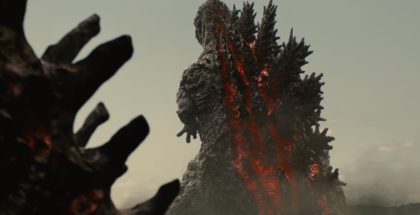VOD film review: Godzilla (2014)
Review Overview
Monster
10Humans
6Awe
8David Farnor | On 13, Oct 2014
Director: Gareth Edwards
Cast: Bryan Cranston, Aaron Taylor-Johnson, Elizabeth Olsen, Ken Watanabe, Sally Hawkins
Certificate: 12
“Is it him?” whispers scientist Vivienne (Hawkins) to her colleague, Dr. Serizawa (Watanabe), as they look at the remains of a gigantic creature.
No one needs to say the name, of course, because it’s etched into everyone’s consciousness, even if they haven’t seen Ishiro Honda’s original.
That 1954 masterpiece saw the monster wade out of the water and decimate Tokyo, a figure from Japan’s past bringing to life the horror of the fission bomb less than a decade after Hiroshima and Nagasaki. To them, he wasn’t a symbol of mortality, he was a physical manifestation of it; judgement for splitting the atom; a spectre that literally breathed radiation.
How can you possibly translate such a specific terror to 2014 America? You can’t. Gareth Edwards’ reboot finds another, similar sensation. With nuclear power plants popping up everywhere – and bombs dropped willy-nilly in the 1950s to try and destroy Gojira – humankind is being rewarded for its recklessness with earthquakes, tsunamis and reactor meltdowns. Nature is restoring the balance.
With what? It’s not until an hour into the film that we even hear the titular name – a presence given the hushed respect befitting a higher power. “Now I am become Death,” Oppenheimer’s voice rang out over Edwards’ first footage from the project. “The destroyer of worlds.”
For Tokyo post-WWII, Gojira rang with an apocalyptic immediacy. In 1998, we start smaller: the world that is destroyed belongs to radiology boffin Joe Brody, whose family life collapses in a Japanese power plant disaster. 15 years later, he’s still obsessively picking through the rubble, despite cautions from his soldier son, Ford (Taylor-Johnson), Ford’s wife, Elle (Olsen), and a host of conspiracy-laden officials.
Ford takes his dad’s trauma across the Pacific to the US, a move that you might expect to lessen the blow. When Bryan Cranston’s on screen, the emotional fallout of the disaster – and the ensuing cover-up – is as devastating as any falling building. When it’s left to Aaron to head up set pieces, there’s less to care about; the Kick-Ass star is likeable, but his part lacks gravitas, mostly gazing open-eyed at the carnage around him.
But as in his debut, Monsters, the director roots everything in humanity’s perspective. He handles the jump from mini-budget to massive blockbuster like a young Spielberg. Most notably, a monorail sequence becomes a heart-stopping race to reunite a young stranger with his parents. As the trio are separated in the chaos, the camera stays at the boy’s height, carted away on the train without being able to stop.
That’s the kind of decision that defines this new beast. Max Borenstein script tiptoes up to him with a perfectly judged restraint; when he does stomp into frame, it’s on his terms. He towers over the screen, unable to fit into a single shot. Where Honda gave us distant model work cut with close-ups of citizens screaming, Edwards gives us close-ups of the thing itself. Monster action is going on in the background, but he fills the foreground with stunned people, closing doors and floating Chinese lanterns – a big guy from the little guy’s point of view.
The ever-fantastic Elizabeth Olsen does her best to bring the tragic consequences of the carnage to the tale, but just as Honda’s movie was more concerned with moral debate, this isn’t ultimately a human drama. Edwards’ presentation means that we identify with the collective, rather than the individual; a race dwarfed by an almighty figure. You can hear it in the rumbles and roars that reverberate through Alexandre Desplat’s score. You can see it in Watanabe’s face, as he marvels at superhuman limbs toppling skyscrapers with godlike indifference.
Witnessing the destruction may not have the atomic association of post-war Japan, but 60 years on, the scale of it is still powerful.
“Is it him?” whispers Sally Hawkins’ scientist. The answer is a ground-trembling yes. Godzilla is back, with an emphasis on the first syllable. Edwards announces his return with the only appropriate response – not fear, but awe.


